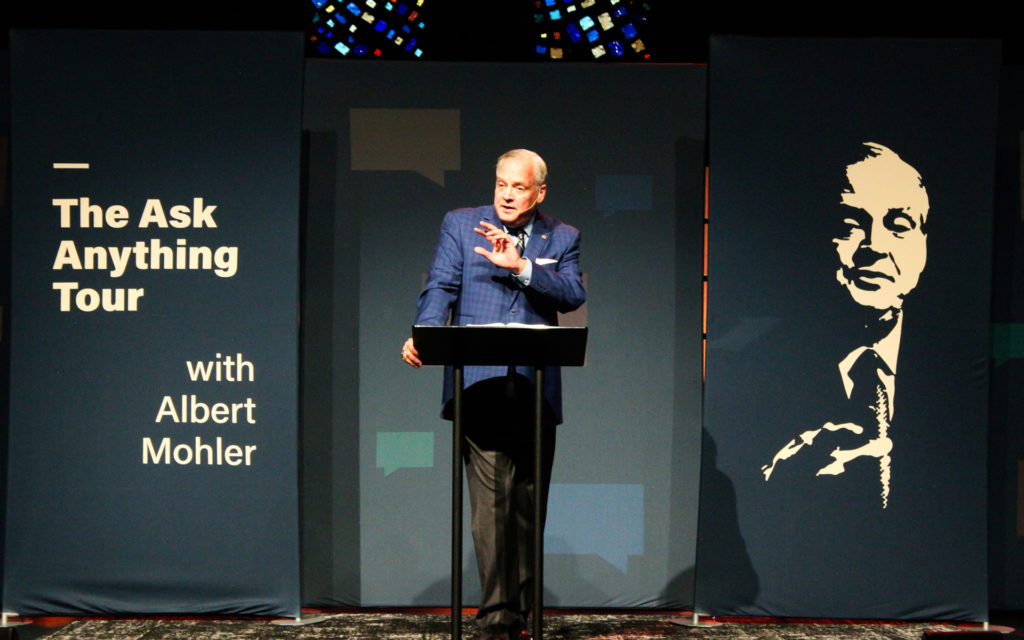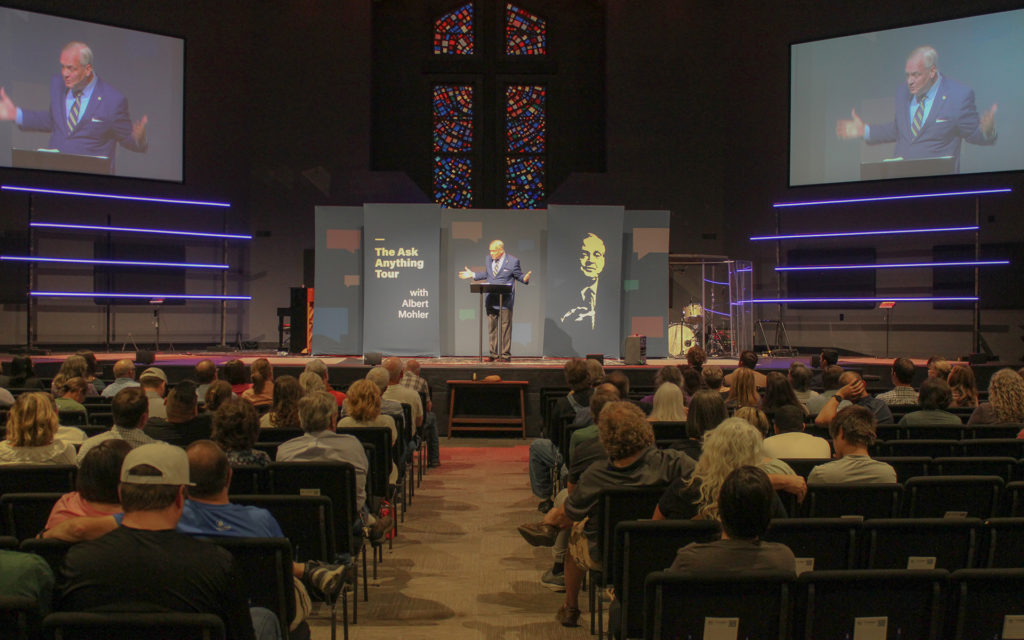
LEBANON, Tenn. (BP) – Before attending the upcoming Southern Baptist Convention Executive Committee meeting in Nashville, Albert Mohler made another stop on his “Ask Anything Tour,” at The Journey Church in nearby Lebanon, Tenn.
Mohler, president of Southern Baptist Theological Seminary in Louisville, Ky., spoke at The Journey Church on Saturday (Sept. 17), where he addressed a wide variety of questions from the solid Saturday night crowd after a short lecture about the importance of Christian worldview.

The event was one in a series, in which Mohler travels to various churches and college campuses to answers questions from the audience regarding Christianity and culture. Mohler also preached at the church the following day (Sept. 18).
Erik Reed, lead pastor at The Journey Church and a graduate of Southern Seminary, introduced Mohler as a “faith hero” of his and said the event was designed to help the congregation better learn how think and reason in public as Christians.
“We know in the world we’re living in today that we can’t afford to simply live in a bubble and just try to isolate ourselves in with our Christian thinking,” Reed said. “We want our Christian thinking to be public thinking.”
Mohler opened his talk by explaining that the erosion of cultural Christianity has made it more necessary than ever for Christians to understand and reason with a biblical worldview.
“Christians now must think as Christians, because nobody is going to do that work for us anymore,” Mohler said.
Apologetics can sometimes be viewed as something only “intellectual Christians” are interested in, Mohler said, adding: “Apologetics is actually the mode of Christian faithfulness in any generation. To be ready to give an answer for the hope that is in us.”
Mohler said it would be extremely arrogant for one Christian to stand up and say he could answer any questions asked of him. Instead, the purpose of the event and the tour is to learn how to work toward those answers as a Christian.
“Being always ready to give an answer doesn’t mean that you always know the answer, it means you always know that Christians can find the answer,” Mohler said.
The first step for Christians is to develop a Christian worldview and recognize that the Bible is not like a reference book, but rather God Himself speaking.
Mohler identified four questions that every worldview must answer, and how Christianity provides answer to those questions – Why is there something rather than nothing; What’s gone wrong; Is there any hope; Where is history headed. The answers to those four questions, he said, essentially align with the four basic points of biblical theology – creation, the fall or sin, redemption and restoration.
After his address, Mohler spent the remaining 45 minutes answering questions from audience members.
Topics of questions included public schools, politics, the second amendment, immigration, the role of the church, abortion, the effectiveness of boycotts and Christian theology.
Although many of the questions related to current cultural topics, a couple of the night’s closing questions were more relational.
One young man asked how to pursue someone with the Gospel with gentleness and respect when they continue to reject it.
Mohler called the question “sweet” and said to keep love at the forefront of patient evangelism.
“I’ve been in that situation a few times and I believe in your generation you will experience that even more often,” Mohler said. “Sometimes all you can do is say, ‘Even if you will not listen to me or hear me, you know that I love you and I am here the instant you’re ready to talk to me.’
“Tell them you’re praying for them even when you’re not with them, and remember that it is Christ that saves anyone. Don’t take it personal, because one of Satan’s devices is to make us hurt when we try to share the Gospel so we don’t risk it. But to the glory of God, we must keep risking it.”
The last question of the night came from a mother of three young children, who asked Mohler how to talk her kids about transgenderism.
In his final answer of the night, Mohler said the same Gospel love is required to share the Gospel with a transgender person as it would with anyone else.
“Our hearts just have to be broken for this person,” he said. “There is trauma in the heart of this person that you met, and so we just have to begin with an enormous concern for this man, woman, boy or girl.
“This is going to be the hardest issue that I can imagine for Christians. My first job in these conversations is not to refute a transgender person, but instead to try to get to talk about Jesus. Yet, in order to do that faithfully I could not reflect or give back what would require me to compromise my convictions. I would just try to find a crack in a person’s defenses and shine as much Gospel as you can.”















